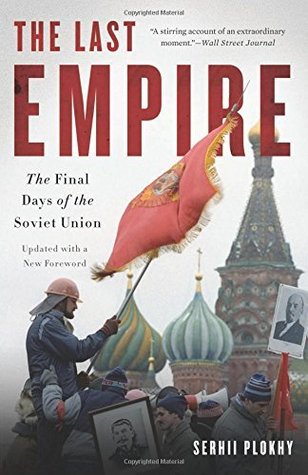by Serhii Plokhy
Basic Books, 2015
Serhii Plokhy’s 2014 book, The Last Empire, examines in fine detail the collapse of the Soviet Union. Plokhy, the Director of the Ukrainian Research Institute, and Professor of Ukrainian History at Harvard University is a Ukrainian American historian who has written extensively on the subjects of Ukrainian, Russian, and Soviet history. Plokhy places himself along with others in his field who, “…argue that while the lost arms race, economic decline, democratic resurgence, and bankruptcy of communist ideals all contributed to the Soviet implosion, they did not predetermine the disintegration of the Soviet Union. That was caused by the imperial foundations, multiethnic composition, and pseudo federal structure of the Soviet state, features whose importance was fully recognized neither by American policymakers in Washington nor by Gorbachev’s advisers in Moscow.” The Last Empire focuses on the last months of the Soviet Union, late July to December 1991. The Soviet Union, or the USSR (Union of Soviet Socialist Republics), was a country in Eastern Europe which was made up of fifteen republics. Formed in 1922 in the wake of the Russian Bolshevik revolution, the city of Moscow served as the USSR’s capital until the Soviet Union was dissolved in December of 1991. In The Last Empire, Plokhy dives straight into the subject in an authoritative manner, challenging a common western ideology of “the triumphalist interpretation of the Soviet collapse as an American victory in the Cold War.” Instead, Plokhy argues that the fall of the Soviet Empire was destined from the beginning, and indeed toppled from the inside. Using recently declassified documents, Plokhy relies heavily on letters, diaries, and phone records to fully immerse his reader into the drama of the subject. We follow Mikhail Gorbachev, the President of the Soviet Union, as he struggles to keep the USSR from crumbling through his fingers. We are witness to two United States Presidents, Ronald Reagan, and George H. W. Bush, as they both work through their own negotiations and policy deals with Gorbachev and the Soviet Union. Many other prominent names grace the pages of the drama as well. The President of Russia, Boris Yeltsin, the sworn enemy of Gorbachev, and the first democratically elected President of Russia, features as a key player as the drama unfolds. We are also given front-row seats to Ukraine’s long-lasting struggle down the path to Soviet, and Russian, independence. Leonid Kravchuk, the first president of Ukraine, plays a large part in the narrative of The Last Empire as he, and many other native Ukrainians, fought with the Soviet Union and tried to win the favor of the West. The relationship between President Gorbachev and President Bush is given much attention, illuminating how both were forced between personal ideologies and their countries, and how far they were willing to go for what they believed in. The Yeltsin-Gorbachev conflict also provides another layer of drama to the story, as do their interactions with other Soviet and Western leaders. The Last Empire as a whole is a comprehensive and well-presented book. Plokhy chose to include much of the true dialogue that was passed between members of the key figures of the story, giving the reader an even more detailed and intimate look into the interpersonal and political lives of the most powerful leaders of the late twentieth century. The Last Empire is at once both detailed, and accessible, making it a must-read for anyone looking to deepen their knowledge or simply learn about the subject for the first time. |
